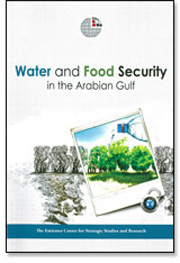Book contents
- Frontmatter
- Contents
- Figures and Tables
- Abbreviations and Acronyms
- Foreword
- Introduction
- Keynote Addresses
- Water Security in a Changing World
- Water Security in the Arabian Gulf Region
- Water Resource Management in the Arabian Gulf Region
- Regional and International Food Security
- Water and Food Security in the UAE
- 9 Water Security in the UAE: Challenges and Opportunities
- 10 Food Security in the United Arab Emirates
- Contributors
- Notes
- Bibliography
- Index
10 - Food Security in the United Arab Emirates
from Water and Food Security in the UAE
Published online by Cambridge University Press: 05 September 2014
- Frontmatter
- Contents
- Figures and Tables
- Abbreviations and Acronyms
- Foreword
- Introduction
- Keynote Addresses
- Water Security in a Changing World
- Water Security in the Arabian Gulf Region
- Water Resource Management in the Arabian Gulf Region
- Regional and International Food Security
- Water and Food Security in the UAE
- 9 Water Security in the UAE: Challenges and Opportunities
- 10 Food Security in the United Arab Emirates
- Contributors
- Notes
- Bibliography
- Index
Summary
The United Arab Emirates is “food secure”; its supermarkets display food from around the globe and the buffets in its hotels are overflowing. Business travelers often complain about gaining weight while traveling in the emirates. Most of this food is not produced in the UAE, but imported—food security does not require food self-sufficiency. The UAE has a high per capita income and can afford to finance food imports. Income inequality is high – as anecdotal evidence in the face of a dearth of statistics would suggest – but no one needs to go to bed hungry, as long as wages are paid.
The global food crisis of 2008 unhinged this sense of security. Rising food prices alone were manageable for an oil- and cash-rich country like the UAE, but trade restrictions by food exporters such as Argentina, Russia, India and Vietnam were disconcerting and raised memories of vulnerability to food import disruption.
The UAE reacted with three different measures: price controls, a build-up of strategic storage, and the announcement of agro-investments abroad, many in countries that are food insecure, such as Sudan or Pakistan. This article explores the motivation for these policy steps and discusses their viability. It argues that price controls are untenable in the long run if not accompanied by some form of subsidy. Strategic storage would benefit from international or regional cooperation in order to pool capacities and avoid unnecessary and expensive storage. Finally, it suggests reasons as to why such a large gap exists between the announcement of agro-investments and their actual implementation.
- Type
- Chapter
- Information
- Water and Food Security in the Arabian Gulf , pp. 265 - 282Publisher: Emirates Center for Strategic Studies and ResearchPrint publication year: 2013



